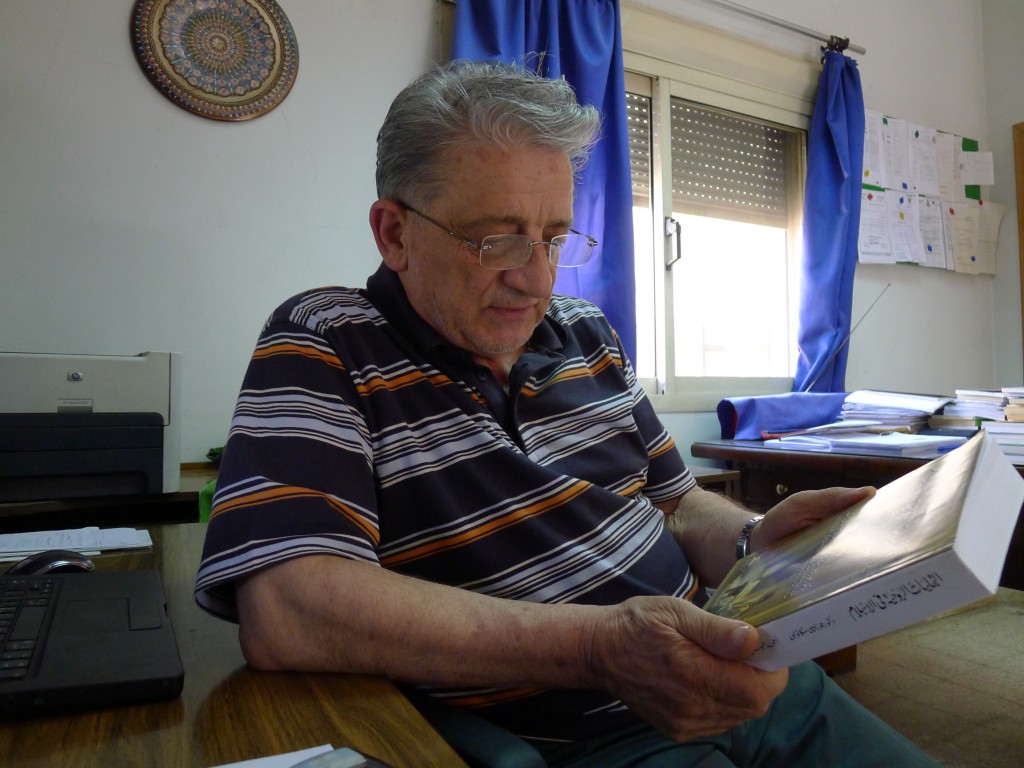
By James Martone
On a recent afternoon in Cairo, Comboni Father Giuseppe Scattolin was delving into 13th-century Sufi poems at his desk in the single room he inhabits, on an upper floor of a building that also houses an Arabic language school and its related administrative offices.
The ancient odes he studied were written by Sufi Arab poet Umar Ibn al-Farid, who lived in Egypt eight centuries ago, leaving behind a trove of verse in Cairo when he died there in 1235.
They are little known in the Arab and Muslim world and even less so in the Christian West. Bringing such Muslim texts to a wider audience is not only Father Scattolin’s passion, but his duty as a Christian, he said from behind his open laptop and piles of books in Arabic, French, Italian and English.
“What does it mean to be Christian? To know the other! What is the identity of Christ … to put on those stupid garments of the cardinals? What does St. Paul say of Christ? ‘He emptied himself,'” Father Scattolin told Catholic News Service.
And so “emptying” himself is what the missionary has been doing for almost four decades now, in the form of numerous publications and studies, in multiple languages, on Islam’s different literatures and schools, and through dialogue and other interfaith activities with Muslims, aimed at furthering understanding among Muslim and Christian communities.
“You must study the other,” said Father Scattolin, whose career in Islamic studies began in Lebanon and Sudan, before leading him in 1980 to settle in Egypt, where he has lived, taught, researched and written since.
He argues in books, interfaith forums and his daily life that understanding among religious groups comes through deepening one’s knowledge of the other’s texts and beliefs, and through accepting the other’s “freedom of choice” to believe in a religion different from one’s own.
“For me, it is difficult for people to put (Christians) as the center when they have their own beliefs,” Father Scattolin said.
“To have faith, you need freedom of choice. We are in a pluralistic world and this is good, as it makes freedom of religion, and there is no faith if you don’t have freedom of religion,” he said.
When not giving classes in Arabic and Islamic studies to mostly Catholic priests and nuns at a Comboni-run institute in Cairo, the 70-year-old Italian devotes his time to researching and writing about Islam and to overseeing Egyptian students’ dissertations on topics related to Sufism, Islam’s inner, mystical dimension.
Father Scattolin’s most recent published work is a historical look at Sufism, which he co-authored in Arabic with Ahmed Hasan Anwar, a Muslim Egyptian student whose doctorate the priest helped oversee. The book won a 2012 UNESCO-sponsored award from Egypt’s Zagazig University for contributing to Arabic culture.
Another book Father Scattolin wrote in Arabic on interreligious dialogue is soon to be released.
“This book I am publishing on dialogue … will have great acceptance,” he predicted.
“I start by saying (that) we all think to be innocent (but) we all have committed violence. Now we only have to repent,” he said of his book, whose title he loosely translated into English as “Meditations on Sufism and Religious Dialogue.”
Father Scattolin said that recently a colleague from an Egyptian university challenged him on the usefulness of promoting understanding between Muslims and Christians through his books and interfaith forums; the colleague said Christians and Muslims ultimately seek to convert the other.
“Either Islam is right and Christianity is wrong, or Christianity is right and Islam is wrong, so why dialogue?” Father Scattolin quoted the young man as saying.
The priest said that, in his response, he drew on what both Islam and Christianity say about the source of one’s belief.
“I in my faith and you in your faith believe faith comes from God, so if I am trying to convert you, I am contradicting my faith,” Scattolin told the man, a Muslim, adding “The only thing we can do is to exchange what we have. After that, each of us is free and responsible before God.'” – CNS